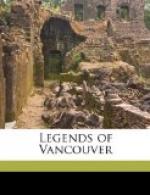I hurried up-shore, hailing her in the Chinook, and as she caught my voice she lifted her paddle directly above her head in the Indian signal of greeting.
As she beached, I greeted her with extended eager hands to assist her ashore, for the klootchman is getting to be an old woman; albeit she paddles against tidewater like a boy in his teens.
“No,” she said, as I begged her to come ashore. “I will wait—me. I just come to fetch Maarda; she been city; she soon come—now.” But she left her “working” attitude and curled like a school-girl in the bow of the canoe, her elbows resting on her paddle which she had flung across the gunwales.
“I have missed you, klootchman; you have not been to see me for three moons, and you have not fished or been at the canneries,” I remarked.
“No,” she said. “I stay home this year.” Then, leaning towards me with grave import in her manner, her eyes, her voice, she added, “I have a grandchild, born first week July, so—I stay.”
So this explained her absence. I, of course, offered congratulations and enquired all about the great event, for this was her first grandchild, and the little person was of importance.
“And are you going to make a fisherman of him?” I asked.
“No, no, not boy-child, it is girl-child,” she answered with some indescribable trick of expression that led me to know she preferred it so.
“You are pleased it is a girl?” I questioned in surprise.
“Very pleased,” she replied emphatically. “Very good luck to have girl for first grandchild. Our tribe not like yours; we want girl children first; we not always wish boy-child born just for fight. Your people, they care only for war-path; our tribe more peaceful. Very good sign first grandchild to be girl. I tell you why: girl-child may be some time mother herself; very grand thing to be mother.”
I felt I had caught the secret of her meaning. She was rejoicing that this little one should some time become one of the mothers of her race. We chatted over it a little longer and she gave me several playful “digs” about my own tribe thinking so much less of motherhood than hers, and so much more of battle and bloodshed. Then we drifted into talk of the sockeye and of the hyiu chickimin the Indians would get.
“Yes, hyiu chickimin,” she repeated with a sigh of satisfaction. “Always; and hyiu muck-a-muck when big salmon run. No more ever come that bad year when not any fish.”
“When was that?” I asked.
“Before you born, or I, or”—pointing across the park to the distant city of Vancouver that breathed its wealth and beauty across the September afternoon—“before that place born, before white man came here—oh! long before.”
Dear old klootchman! I knew by the dusk in her eyes that she was back in her Land of Legends, and that soon I would be the richer in my hoard of Indian lore. She sat, still leaning on her paddle; her eyes, half-closed, rested on the distant outline of the blurred heights across the Inlet. I shall not further attempt her broken English, for this is but the shadow of her story, and without her unique personality the legend is as a flower that lacks both color and fragrance. She called it “The Lost Salmon-run.”




